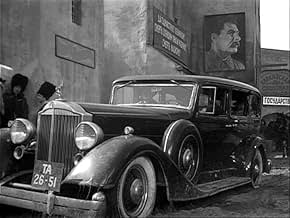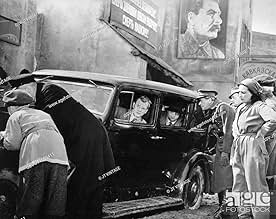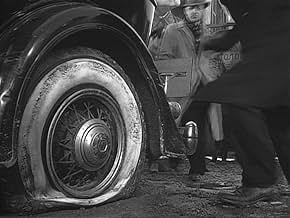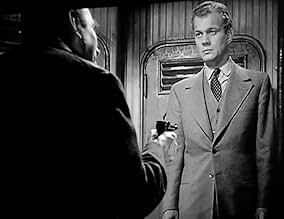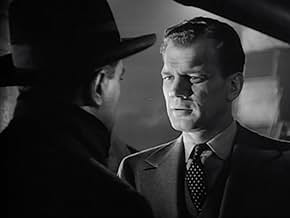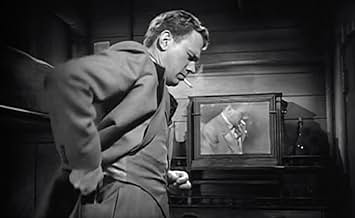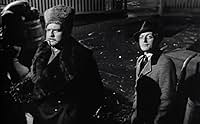PUNTUACIÓN EN IMDb
6,5/10
5 mil
TU PUNTUACIÓN
Añade un argumento en tu idiomaAn American ballistics expert in Turkey finds himself targeted by German agents. Safe passage home by ship is arranged for him, but he soon discovers that his pursuers are also on board.An American ballistics expert in Turkey finds himself targeted by German agents. Safe passage home by ship is arranged for him, but he soon discovers that his pursuers are also on board.An American ballistics expert in Turkey finds himself targeted by German agents. Safe passage home by ship is arranged for him, but he soon discovers that his pursuers are also on board.
- Dirección
- Guión
- Reparto principal
Dolores Del Río
- Josette Martel
- (as Dolores Del Rio)
Anna De Linsky
- Russian Maid at Batumi Hotel
- (sin acreditar)
Jerome de Nuccio
- Turkish Officer
- (sin acreditar)
Herbert Drake
- Ship's Steward
- (sin acreditar)
Reseñas destacadas
`Journey Into Fear' certainly has an Orson Welles look. Although he received neither directing nor writing credit (credit went to Norman Foster and Joseph Cotten, respectively), I think that most of what is there is his. The problem is that there is not enough there there. The on-board relationships should have been developed more. All of them seem perfunctory.
Combining the shooting by a good marksman who misses his target and stalking him in the nightclub are combined into an altogether more satisfying single event.The escape from the Nazis is more protracted and less violent than in Eric Ambler's book. It is very noirish and photogenic, and the combination of wet chase and the presence of a murky character played by Orson Welles and an all-American one played by Joseph Cotten prefigure `The Third Man.' Joseph Cotten had some of the same American innocence and ready outrage in both films. He's an important munitions engineer here and a hack western writing there. He doesn't get the dark beauty (Alida Valli or Dolores del Rio) in either, though he has and keeps a wife in `Journey.'
The film probably makes sense to those unfamiliar with the book (and such viewers aren't distracted by thinking about what's been changed). It is suspenseful even for someone like me who recently read the book
Combining the shooting by a good marksman who misses his target and stalking him in the nightclub are combined into an altogether more satisfying single event.The escape from the Nazis is more protracted and less violent than in Eric Ambler's book. It is very noirish and photogenic, and the combination of wet chase and the presence of a murky character played by Orson Welles and an all-American one played by Joseph Cotten prefigure `The Third Man.' Joseph Cotten had some of the same American innocence and ready outrage in both films. He's an important munitions engineer here and a hack western writing there. He doesn't get the dark beauty (Alida Valli or Dolores del Rio) in either, though he has and keeps a wife in `Journey.'
The film probably makes sense to those unfamiliar with the book (and such viewers aren't distracted by thinking about what's been changed). It is suspenseful even for someone like me who recently read the book
Somewhere along the way, someone took scissors to this film and left it with plot holes that don't connect. Despite the obvious flaws in continuity and plotting, Eric Ambler's novel has been so changed in transferring it to the screen that he didn't even recognize it as his own story, according to Robert Osborne of TCM.
The marquee value of Joseph Cotten and Orson Welles is likely to lure viewers into thinking they will see another classic along the lines of THE THIRD MAN. Not so. This is a visually interesting espionage yarn, very little of which is coherent and much of which leaves the viewer in as much confusion as Joseph Cotten's character is. Whom should he trust and who is really trying to kill him?
Cotten plays a U.S. Naval engineer aboard a dilapidated freighter who learns that Nazi agents are planning to kill him. The usual Welles Mercury Theater players fill the supporting roles, along with the beautiful Dolores Del Rio. Once the film leaves the claustrophobic freighter and shows Cotten running from his captors, it takes on heightened interest. The scenes in the torrential rain are wonderfully staged and the B&W cinematography gives the illusion of menace in every shadow.
But there is virtually no coherent plot and Welles is completely wasted in a small role that he underplays. While the credits say that Norman Foster directed, it is highly probable that Welles himself directed much of it. Perhaps it all made more sense before the running time was cut down to 71 minutes.
Ruth Warrick has a couple of nice moments as Cotten's patient wife but none of the characters are fleshed out enough to really understand or care about. Cotten gives his usual workmanlike performance but it all ends with a rather abrupt finish, much ado about nothing.
Too many weaknesses to call a classic.
The marquee value of Joseph Cotten and Orson Welles is likely to lure viewers into thinking they will see another classic along the lines of THE THIRD MAN. Not so. This is a visually interesting espionage yarn, very little of which is coherent and much of which leaves the viewer in as much confusion as Joseph Cotten's character is. Whom should he trust and who is really trying to kill him?
Cotten plays a U.S. Naval engineer aboard a dilapidated freighter who learns that Nazi agents are planning to kill him. The usual Welles Mercury Theater players fill the supporting roles, along with the beautiful Dolores Del Rio. Once the film leaves the claustrophobic freighter and shows Cotten running from his captors, it takes on heightened interest. The scenes in the torrential rain are wonderfully staged and the B&W cinematography gives the illusion of menace in every shadow.
But there is virtually no coherent plot and Welles is completely wasted in a small role that he underplays. While the credits say that Norman Foster directed, it is highly probable that Welles himself directed much of it. Perhaps it all made more sense before the running time was cut down to 71 minutes.
Ruth Warrick has a couple of nice moments as Cotten's patient wife but none of the characters are fleshed out enough to really understand or care about. Cotten gives his usual workmanlike performance but it all ends with a rather abrupt finish, much ado about nothing.
Too many weaknesses to call a classic.
While returning from a conference munitions expert Joseph Cotten and his wife Ruth Warrick are taken to a nightclub in Istanbul by the mysterious Edward Sloane where Cotten is almost killed. Magician Hans Conreid is a victim of his own slight of hand, but it's Cotten who's the target as Orson Welles as the Turkish police inspector deduces.
Welles's solution get Cotten out of the country so if he's killed at least it won't be on his watch. Welles books passage on a tramp freighter for Cotten and the freighter is loaded with highly interesting characters, one of whom at least is a Nazi assassin.
This was another Mercury Theater production with most of the regulars from Citizen Kane/The Magnificent Ambersons back again. Welles's police inspector is a small, but crucial part of the story.
Welles, for whatever reason is being unduly modest. Journey Into Fear is undoubtedly the greatest film that Orson Welles never took credit for directing. I can find certain touches here from Citizen Kane, The Magnificent Ambersons, and The Stranger. If he didn't officially direct you can take it to the bank that Norman Foster knew exactly what Welles was trying to get out of each and every scene.
Look also here for a good performance by Mexican cinema great Dolores Del Rio as a most mysterious femme fatale on the freighter.
Journey Into Fear is a short film, slightly less than 70 minutes running time. I'm sure that RKO had it playing at the bottom end of double features. Maybe we'll see a 'director's cut' of this one day and know what Welles's own perspective was.
Welles's solution get Cotten out of the country so if he's killed at least it won't be on his watch. Welles books passage on a tramp freighter for Cotten and the freighter is loaded with highly interesting characters, one of whom at least is a Nazi assassin.
This was another Mercury Theater production with most of the regulars from Citizen Kane/The Magnificent Ambersons back again. Welles's police inspector is a small, but crucial part of the story.
Welles, for whatever reason is being unduly modest. Journey Into Fear is undoubtedly the greatest film that Orson Welles never took credit for directing. I can find certain touches here from Citizen Kane, The Magnificent Ambersons, and The Stranger. If he didn't officially direct you can take it to the bank that Norman Foster knew exactly what Welles was trying to get out of each and every scene.
Look also here for a good performance by Mexican cinema great Dolores Del Rio as a most mysterious femme fatale on the freighter.
Journey Into Fear is a short film, slightly less than 70 minutes running time. I'm sure that RKO had it playing at the bottom end of double features. Maybe we'll see a 'director's cut' of this one day and know what Welles's own perspective was.
Joseph Cotten plays an American armaments engineer on the run from the Nazis in "Journey into Fear," a 1943 film with a script by Cotten (from a story by Eric Ambler) and costarring Orson Welles and Delores del Rio. Cotten is working on a deal to supply Turkey with weapons to fight the Axis. The Nazis don't want the deal made and are trying to stop Cotten from getting back to the U.S.
There are some very exciting scenes in this extremely atmospheric film, in particular on the ledge of a building between Cotten and the terrifying assassin. Most of the film takes place on board a dingy ship where Cotten is taken, thus beginning his Kafka-esquire nightmare.
This is an entertaining film for sure, but I've always been troubled by it. First of all, it seems like there are scenes missing. Second, it's on the confusing side since there are irrelevant characters thrown in. Third, you can drive a truck through some of the plot holes. Fourth, the ending to me has always felt abrupt.
Suspenseful? Yes. Intriguing? Yes. Ultimately disappointing? Yes. Cotten is good as a man blundering through something he can't quite figure out - the problem is, the audience can't quite figure it out either. Welles has a small but effective role as Dr. Haki.
Strong on style, weak on substance.
There are some very exciting scenes in this extremely atmospheric film, in particular on the ledge of a building between Cotten and the terrifying assassin. Most of the film takes place on board a dingy ship where Cotten is taken, thus beginning his Kafka-esquire nightmare.
This is an entertaining film for sure, but I've always been troubled by it. First of all, it seems like there are scenes missing. Second, it's on the confusing side since there are irrelevant characters thrown in. Third, you can drive a truck through some of the plot holes. Fourth, the ending to me has always felt abrupt.
Suspenseful? Yes. Intriguing? Yes. Ultimately disappointing? Yes. Cotten is good as a man blundering through something he can't quite figure out - the problem is, the audience can't quite figure it out either. Welles has a small but effective role as Dr. Haki.
Strong on style, weak on substance.
Well it says Journey Into Fear was directed by Norman Foster, but many sources say it was actually Orson Welles who directed it. Possible of course since this Mercury Theatre production was produced, co- written {with co-star Joseph Cotton} and starred big Orson himself. But wait! Welles is on record as saying he did no directing on the film and it was his friend Foster in the chair. Except for Welles' own scenes which were directed by anyone handy since they were rushing because Welles was due in Brazil to film It's All True! There has also been re-cuts by Welles, added scenes and a narration at the beginning and end that has been and gone over the years. It's all appropriate confusing conjecture tho since the film itself has a strange quirkiness nestling within its arresting visuals.
The story is based on Eric Ambler's highly regarded spy thriller, and sees Howard Graham {Joseph Cotton} as an American engineer, who after a conference in Turkey finds that someone is trying to kill him. We are then thrust into a murky world of espionage where everybody, their motives, and their identities are suspect. Graham is the classic innocent man abroad, we the viewers, as well as everyone in the story but Graham, knows more than he does! I bet Hitchcock loved this film for it be right up his alley. The majority of the film takes place aboard a cramped dilapidated liner, this gives off a wonderfully claustrophobic feel to proceedings. The stifling nature further enhanced by the fact that 99% of the film is set at night time, with Karl Struss' photography utilising shadows and exuding an almost bizarre menacing sheen. There's some nice technical Welles trademarks in here, such as crane shots {the opening scene is moodily awesome} and Welles' well publicised love of magic is given a cute nod during one particularly impacting sequence.
Along side Cotton the cast contains solid performers like Dolores del Rio, Everett Sloane, Ruth Warwick and Agnes Moorehead. But it's Cotton who rightly makes the big impact. Understated and quiet, his Howard Graham infuriates with his inability to grasp what is going on, or to act at times when it clearly calls for the swift clank of brain being put into gear. A real smart bit of casting here from Foster, Welles or whoever! Journey Into Fear, for texture and technical composition belongs in the film-noir genre, certainly as far as the early cycle goes. But really it's a film for the general cinema purists, at times brilliant, at others chaotic, it remains engrossing from start to finish. See it if you can. 8/10
The story is based on Eric Ambler's highly regarded spy thriller, and sees Howard Graham {Joseph Cotton} as an American engineer, who after a conference in Turkey finds that someone is trying to kill him. We are then thrust into a murky world of espionage where everybody, their motives, and their identities are suspect. Graham is the classic innocent man abroad, we the viewers, as well as everyone in the story but Graham, knows more than he does! I bet Hitchcock loved this film for it be right up his alley. The majority of the film takes place aboard a cramped dilapidated liner, this gives off a wonderfully claustrophobic feel to proceedings. The stifling nature further enhanced by the fact that 99% of the film is set at night time, with Karl Struss' photography utilising shadows and exuding an almost bizarre menacing sheen. There's some nice technical Welles trademarks in here, such as crane shots {the opening scene is moodily awesome} and Welles' well publicised love of magic is given a cute nod during one particularly impacting sequence.
Along side Cotton the cast contains solid performers like Dolores del Rio, Everett Sloane, Ruth Warwick and Agnes Moorehead. But it's Cotton who rightly makes the big impact. Understated and quiet, his Howard Graham infuriates with his inability to grasp what is going on, or to act at times when it clearly calls for the swift clank of brain being put into gear. A real smart bit of casting here from Foster, Welles or whoever! Journey Into Fear, for texture and technical composition belongs in the film-noir genre, certainly as far as the early cycle goes. But really it's a film for the general cinema purists, at times brilliant, at others chaotic, it remains engrossing from start to finish. See it if you can. 8/10
¿Sabías que...?
- CuriosidadesThe great stage actor Richard Bennett had been brought back to films by Orson Welles for El cuarto mandamiento (1942). Although his performance as old Major Amberson has become legendary, it was achieved with great difficulty, as Bennett, by then an old man near death, found it hard to remember his lines, and his eyesight was too poor for him to be able to read cue-cards. Welles's patience in dealing with these problems has been widely described. When he cast Bennett as the ship's captain, he overcame the problems simply by giving Bennett no dialogue at all, although the character has several memorable scenes. It was Bennett's final film role.
- PifiasDuring the chase outside the hotel in the rain, Banat's pistol, a P-08 "Luger" runs out of ammunition, but the action closes normally after he fires the last shot. This particular pistol was designed so that the action stays open after the last round is fired, giving a clear indication to the user that the gun is empty.
- Citas
Colonel Haki: Ah, you have this advantage over the soldier, Mr. Graham. You can run away without being a coward.
- Versiones alternativasIn 2005 an alternate cut was shown at the Orson Welles film retrospective in Locarno, Switzerland. It was the original European release print, lacking the narration and ending of the US version but including about eight minutes of footage later deleted by RKO, reportedly for political and censorship reasons. This alternate version, assembled by Stefan Droessler of the Münchner Filmmuseum, was shown at the Museum of Modern Art on Saturday, November 21, 2015.
- ConexionesFeatured in Terminus... the Theater of Science Fiction: Journey into Fear (1970)
- Banda sonoraC'est mon coeur
(uncredited)
Written by Steven Morgan
Selecciones populares
Inicia sesión para calificar y añadir a tu lista para recibir recomendaciones personalizadas
- How long is Journey Into Fear?Con tecnología de Alexa
Detalles
- Duración1 hora 8 minutos
- Color
- Relación de aspecto
- 1.37 : 1
Contribuir a esta página
Sugerir un cambio o añadir el contenido que falta

